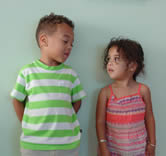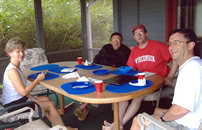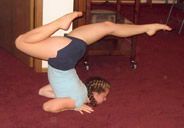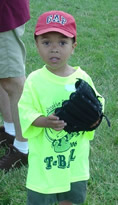Click for Parent Pointers or Teacher Tips sections
 The label “competitive” frequently calls forth visual images of children who not only expect to win all the time, but don’t deal well with losing. Examples of competitiveness shared with me often include relentless arguments with teachers about extra points on test grades, cheating to get good grades or win at sports, losing tempers or pouting at times of defeat, obnoxious bragging about victories and quitting activities or making excuses rather than coping with losing. Those negative characteristics of poor competitors give competition a bad reputation and may even cause children to deny their competitive feelings rather than cope with them healthfully.
The label “competitive” frequently calls forth visual images of children who not only expect to win all the time, but don’t deal well with losing. Examples of competitiveness shared with me often include relentless arguments with teachers about extra points on test grades, cheating to get good grades or win at sports, losing tempers or pouting at times of defeat, obnoxious bragging about victories and quitting activities or making excuses rather than coping with losing. Those negative characteristics of poor competitors give competition a bad reputation and may even cause children to deny their competitive feelings rather than cope with them healthfully.
Most children would like to be best at something, whether it be favorite in the family, best at academics, sports, music, art, or most beautiful or popular. While good athletic coaches typically try to guide children to good sportsmanship, classroom teachers and parents rarely address competition issues in the home or classroom. Children struggling to cope with competition are more likely to be berated for jealous feelings instead of receiving assistance in how to cope with normal jealousy. Calling children “jealous” may cause them to lose hope and confidence, thus stealing from them their abilities to initiate healthy involvement in competitive activities. They may feel like losers and feel guilty for wishing they could win.
In my research on the childhoods of successful women, winning in competition was the most frequently mentioned positive experience. Furthermore, many women described defining moments where they learned from their losing experiences. Winning can be exhilarating and motivating for all children, and all children can learn from losing experiences.
COMPETITION IN THE FAMILY
The most difficult kind of competition to cope with can be within the family. When another sibling is born or a parent remarries, the child may feel irrationally and extraordinarily jealous, although he knows he’s expected to be happy about the new member of the family. I call this concept “dethronement.” Dethroned children typically exhibit negativity, anger, or sadness. Their personalities may change so dramatically that parents, teachers, and even doctors may assume they’re undergoing clinical depression. Some comments from parents about dethroned children are in the below.
"He was a delightful child until I brought our second son home from the hospital; he was like a wild animal thereafter. I couldn't seem to control him at all."
"She was a marvelous little girl until her brother started reading as well as she did. She became obnoxious, unpleasant, negative and attention seeking and only seemed happy when she was alone with me."
"At first, after our divorce, my daughter loved to visit me, but after I introduced my new finance, she was continuously obnoxious unless I was alone with her."
 Parents can explain that they understand that their children may have some uncomfortable or jealous feelings, but in the long run they’ll enjoy their new sibling. Praising your child for helpful and kind behavior makes a difference. In the cases of either rivalry with a sibling or a new adult partner, having some time alone with their parent helps them to adjust. Excursions with the new adult can facilitate bonding.
Parents can explain that they understand that their children may have some uncomfortable or jealous feelings, but in the long run they’ll enjoy their new sibling. Praising your child for helpful and kind behavior makes a difference. In the cases of either rivalry with a sibling or a new adult partner, having some time alone with their parent helps them to adjust. Excursions with the new adult can facilitate bonding.
Emphasis on cooperation within the family, rather than competition, is key. Children can be encouraged to be supportive to each other, and parents can admire them for being supportive. They can view their sibling’s achievements as something in which they can share. Teaching siblings to cheer for each other’s performance is a valuable counterbalancing technique in dealing with children’s difficult feelings of sibling rivalry.
COMPETITION IN LIFE
Some children live in highly competitive families and achieve in many activities, but winning needs perspective. It’s good for kids to value excellence as long as they don’t feel valued only for their excellence. Parents’ messages that “we like children who win, who are the smartest, and who excel,” should be changed to “we like children who try, who are responsible, and who make positive and sincere efforts.” If it feels to children as though they have to perform “best” to earn their parents’ love and attention, they’ll only select areas of participation in which they’re convinced they can excel and will feel pressured and anxious. They’ll learn to avoid and fear other forms of competition.
 As parents, it’s good to model participation in some activities where you don’t always win. You’ll want to voice respect for the talent and skill of your competitors so that your children can hear that admiration process. You may be building unlikely dreams and unreasonable competitiveness and pressures by suggesting that if she practices regularly, she may be skating in the Olympics some day. There will be time enough later for such lofty goals if your daughter displays extraordinary talent. At this early date, competition with her friends is a reasonable standard to set for both fun and glory.
As parents, it’s good to model participation in some activities where you don’t always win. You’ll want to voice respect for the talent and skill of your competitors so that your children can hear that admiration process. You may be building unlikely dreams and unreasonable competitiveness and pressures by suggesting that if she practices regularly, she may be skating in the Olympics some day. There will be time enough later for such lofty goals if your daughter displays extraordinary talent. At this early date, competition with her friends is a reasonable standard to set for both fun and glory.
Parents frequently tell their children they can do anything if they’re willing to work hard enough. Although it’s true enough that practice enhances skill and teaching a work ethic is important, your children, despite all efforts, may not make it to Olympic sports, the Metropolitan Opera, Harvard Medical School, The Broadway stage, or the Green Bay Packers. Children may take these expectations seriously and may assume that if they’re stars of the sixth grade soccer team, they’re on the way to professional soccer. They practice soccer earnestly, but schoolwork or other activities seem undeserving of commitment. Learning to work in arenas where they’re not stars is an essential component of learning to function effectively in a competitive society.
COMPETITION IN SCHOOL
The ability to function in competition is central to school and lifelong achievement. Underachievers haven’t learned the techniques of competing. Although they may win happily, they haven’t learned to recover after losses. They lose their tempers, make excuses, quit, avoid effort and don’t take the risk of working unless they’re certain to win.
Parents can teach their children to be resilient. Children can learn to creatively view their failures and losses as learning experiences. When failure occurs, they can identify the problems, remedy the deficiencies, reset their goals, and grow from their experiences. As coping strategies, they can laugh at their errors, determine to work harder, and/or redesign their achievement goals. Most important, they can see themselves as falling short of a goal, not falling short as people.
HEALTHY PROBLEM SOLVING
To help their children cope with losses, parents should first examine their own competitive style; children may have learned maladaptive responses to failure at home by copying parents. For example, parents may quit too quickly if a problem gets difficult, avoid competition, or habitually blame external sources for their own shortcomings or lack of effort. They may blame teachers for their children’s problems instead of expecting children to handle their own responsibilities.
 Children should be taught to identify creative alternatives for their losses or failures. They can recognize that even very talented people cannot be “Number 1” in everything, but that every person has areas in which they’re talented. Children shouldn’t feel insecure or threatened by an occasional setback, nor should they receive too much sympathy. Your feeling sorry for them may make them feel like their loss is more serious. Discussions of children’s losses may need to wait until after the emotional tension is reduced in order to avoid defensive responses. Parents can’t expect rational perception or logical thinking during the immediate stress period following an upsetting defeat.
Children should be taught to identify creative alternatives for their losses or failures. They can recognize that even very talented people cannot be “Number 1” in everything, but that every person has areas in which they’re talented. Children shouldn’t feel insecure or threatened by an occasional setback, nor should they receive too much sympathy. Your feeling sorry for them may make them feel like their loss is more serious. Discussions of children’s losses may need to wait until after the emotional tension is reduced in order to avoid defensive responses. Parents can’t expect rational perception or logical thinking during the immediate stress period following an upsetting defeat.
A questioning approach, rather than a lecture, may better help children understand that (1) they cannot always win, (2) disappointment doesn’t mean they’re failures, (3) the particular experience simply wasn’t as successful as they had hoped it would be, (4) everyone would like to be smarter than they are, and especially, (5) the main goal is to play the learning game at their best performance level, regardless of their competitive ranking. Effort counts.
Parent Pointers1
Teaching Healthy Competition
While you can enthusiastically share your children’s victories and commiserate with their defeats, remind them from time to time that regardless of performance, there’s always someone better than them and always someone worse. Explain to your children first place is only temporary. If they’re first on one level, they’ll soon be competing on a higher level with others who were also first.
Even while your children are winning, they can learn to notice, admire, and communicate their admiration to other performers. They’ll feel better about jealousy as they admire others.
Try to make family and friendship as non competitive as possible. It’s normal to feel and express jealous feelings, but you can teach them to feel neat about having a whole, smart family or feel good about having a friend who’s successful. You can help them to be sensitive when a friend does less well than they. They can understand that they may never be as smart as a brother or sister, but being second or third best is still smart.
In order to develop a skill in which children lack confidence, they should learn to compete first with their own past performance (personal best).
After learning personal best competition, they can try team competition where they share winning or losing with others. They can join music, math, science or creativity teams.
Don’t let them “put all their eggs in one basket.” If they’re best at academics, sports or music can be the place to learn resilience. If they’re best at sports, math or music teams may help to decrease feelings of pressure.
Balance competitive activities with non competitive interests for relaxation and fun.
Parent Pointers1
HOW TO TEACH COMPETITION BY GAME PLAYING
Family game playing is a good exercise in learning to compete.
Game playing should always be designed as reasonably fair competition, which may mean adults or older siblings should give younger children a handicap.
Don’t just let children win. Learning the balance between winning and losing is the goal. Any time winning is fixed before the game is played, it invalidates the teaching of competition.
Don’t feel too sorry for children when they lose.
Don’t pay a lot of attention to children’s fears of trying, but let them join in when they’re ready.
Don’t let children’s avoidance of competition keep the rest of the family from having fun. Watching you play will tempt them to join in.
Humor and laughter go a long way in easing tensions.
The family that surrounds itself with family fun and laughter is more likely to motivate its children to learn, work, and accomplish.
Teacher Tips2
HOW TO USE SPORTS TO ENCOURAGE ACHIEVEMENT
 Have the class choose a sport they’d like to discuss. A vote may be necessary, but you may wish to discuss two simultaneously.
Have the class choose a sport they’d like to discuss. A vote may be necessary, but you may wish to discuss two simultaneously.
Ask students to volunteer to give the rules of good sportsmanship for the particular sport(s) chosen.
Write the rules on the board. Help kids expand their ideas by considering winning, losing, coach respect, practice, teamwork, etc., specifically applied to the sport(s) chosen
Ask students to describe how each of the rules selected can be applied to sportsmanship or school achievement.
Help students personalize the rules by writing their own resolutions on how they can use the rules of team sports to help them to have good classroom academic sportsmanship.
1Adapted from Parent Pointers, Learning Leads Q-Cards by Sylvia Rimm (1990, Apple Publishing Co. Available at 800-795-7466.) Click here to order cards
2Adapated from Teacher Tips, Learning Leads Q-Cards. (1996, Apple Publishing Co. Available at 800-795-7466) Click here to order cards
©2007 by Sylvia B. Rimm. All rights reserved. This publication, or parts thereof, may not be reproduced in any form without written permission of the author.
